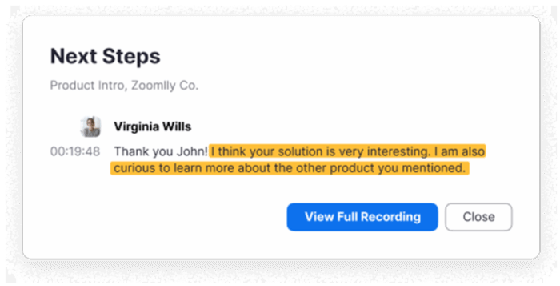
putilov_denis - stock.adobe.com
Zoom launches AI tool for sales departments
Zoom's AI insights help sales teams by analyzing video call transcripts for information to determine the next step in negotiations with prospective customers.
Zoom has built an AI tool that extracts information from video call transcripts to help sales teams close deals.
Zoom IQ for Sales, released this week, analyzes calls for trends and action items to help companies make more money from video meetings with customers, Josh Dulberger, Zoom's head of product, data and AI, said. The product adds $79 per seat, per month to the Zoom Meetings license.
IQ for Sales will examine video call transcripts using machine learning models, flagging potential next steps based on customers' questions. After-the-meeting metrics let salespeople know if they speak too quickly or use filler words. The software also tracks how often a competitor's name comes up during a meeting.
Zoom IQ's insights should improve sales teams by providing more data on their effectiveness at making deals. Collected data could also help determine better sales practices.
Zoom IQ can pull data from Salesforce, linking video calls to ongoing sales negotiations recorded in the CRM software. The integration allows Zoom IQ to analyze all the calls associated with the discussions. Following a deal, the software can determine which topics arose most frequently, how much time each stage of negotiations took and which negotiators made the final purchasing decision.
Software like IQ for Sales could become more critical if companies use video conferencing to reduce travel expenses. In a 2020 survey of 3,626 corporate tech buyers, consulting firm McKinsey found that the majority preferred remote interactions to in-person sales meetings. The reasons included ease of scheduling, travel savings and safety.
While video conferencing has become a more critical communication tool in business, general use has slowed from pandemic highs as employees return to offices. As a result, Zoom has had to look elsewhere to achieve higher revenue growth. IQ for Sales is Zoom's latest attempt to diversify its product line following a cloud-based contact center launched in February.

"Sales is a business function that gets a lot of attention with experimental IT investment, since anything that boosts sales is easy to justify the budget for," Constellation Research analyst Dion Hinchcliffe said.
IQ for Sales is the first in a line of planned add-on tools that will use AI to assist with video calls. A future IQ offering would help companies use Zoom Contact Center, Dulberger said. Businesses would use the IQ products together to analyze every interaction with a customer, giving firms a greater understanding of the problems their clients face.
While IQ for Sales performs an after-the-fact analysis of calls, a contact-center AI tool would tell service agents in real time if they were talking too fast or not allowing the customer enough time to speak.
In addition to IQ for Sales, the company will roll out other product improvements this month. They include:
- The Zoom whiteboard. Zoom will launch its whiteboard collaboration tool on April 19. Workers can add custom shapes, sticky notes and connectors to the board as they brainstorm. The whiteboard is in Zoom meetings and works with conference hardware supporting Zoom Rooms. The company said it plans to add a chatroom to the whiteboard soon.
- Branding for webinars. Companies hosting a Zoom webinar will be able to brand virtual backgrounds, the wallpaper of video windows, and panelist name tags with custom images.
- Reactions to webinars. View-only attendees of a Zoom webinar can use emojis to react to a session's content. Hosts, panelists and fellow attendees will see the reactions at the bottom-right corner of the video window.
Mike Gleason is a reporter covering unified communications and collaboration tools. He previously covered communities in the MetroWest region of Massachusetts for the Milford Daily News, Walpole Times, Sharon Advocate and Medfield Press. He has also worked for newspapers in central Massachusetts and southwestern Vermont and served as a local editor for Patch. He can be found on Twitter at @MGleason_TT.








